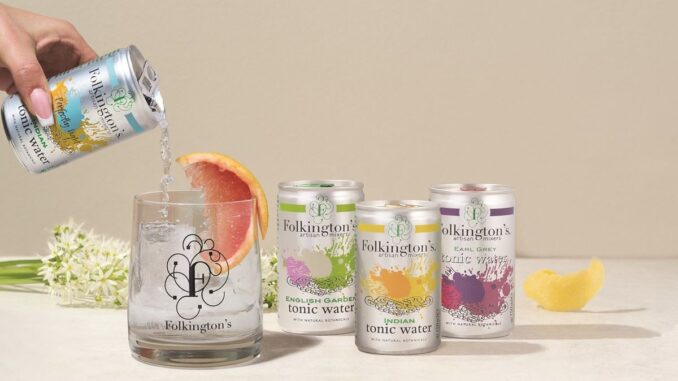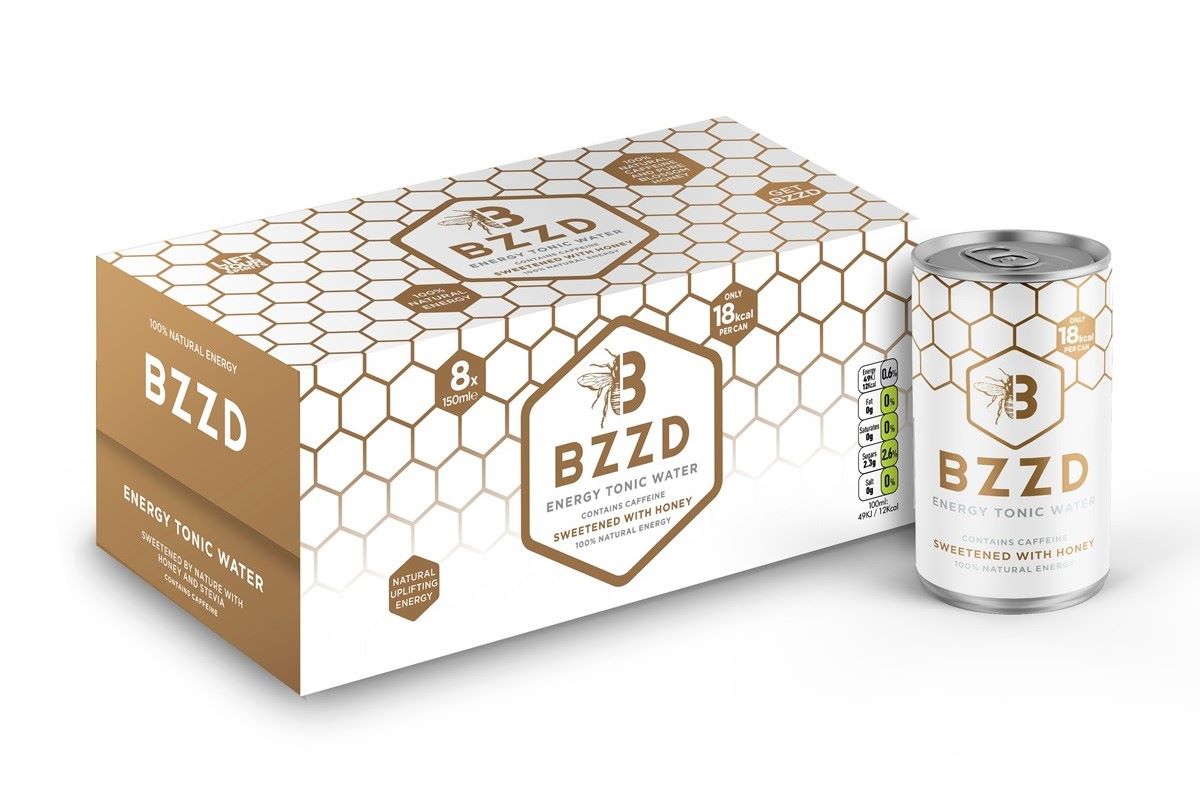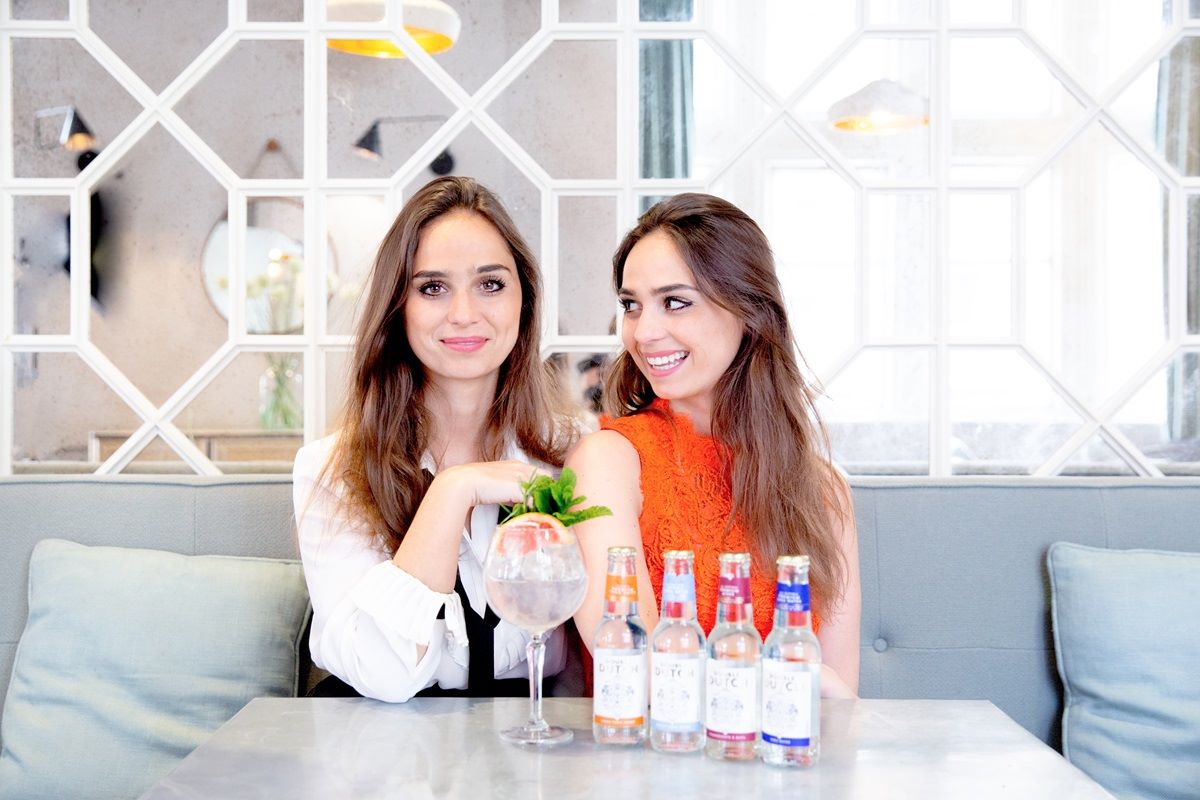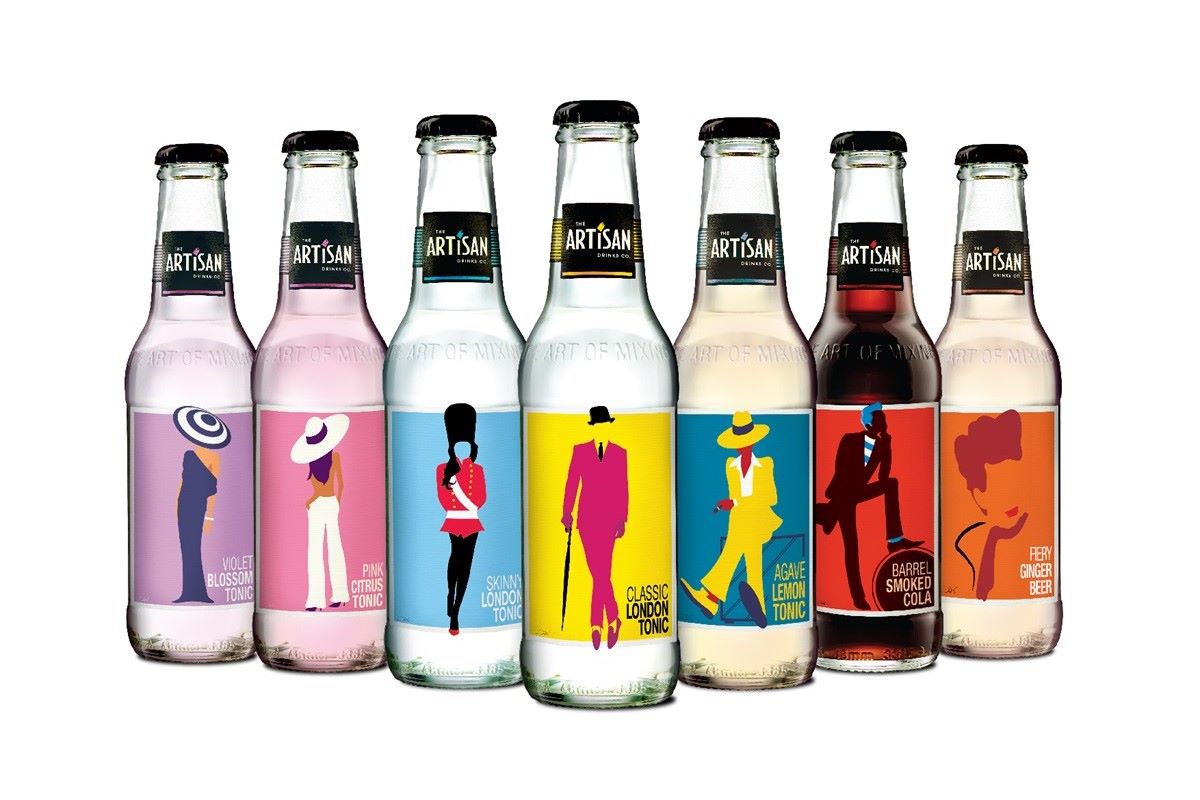
The world is turning its back on “Slimline Indians” and dry Canadians. Instead, it’s opting for skinny tonics and Northumbrians.
France has Hysope in Bordeaux, Germany Thomas Henry and India, Swami. The US may have Polar, Seagram’s, Buzbee’s, Owen’s, Boylan Heritage Tonic, Q, Top Note and Mrs Ryan Reynolds’ Betty Buzz but the UK is still the powerhouse of the tonic world.
Steve Cooper used to work for Cadbury Schweppes and Coca-Cola before deciding to go it alone and make his own mixers and found Artisan Drinks, based at the Hawkhill Business Park, Northumberland. He is the man behind the latest north-east England tonic boom, commenting:
“The spirits market has a wonderful array of craft brands, traditional to modern, reserved through to colourful. Yet, despite strong growth, there is little innovation in the mixer category. Until now.”
The company began when an artist, an entrepreneur and a mixologist met in Mikey Enright’s The Barber Shop. The Sydney institution is a cocktail bar which also offers male grooming services. Cooper also worked for drinks brand Feel Good Drinks. Alan Walsh is an artist and gallery owner living in Cannes. As well as violet blossom tonic and agave lemon, they now make a “truly adult cola”, barrel smoked.
“We wanted to do things differently and raise the bar higher by bringing craft quality to the mixer category. We’ve combined the worlds of art and mixology to create our seven mixer Artisan range. We know that the best bars, restaurants and hotels share our desire to innovate and lead rather than simply follow the mass market crowd. After all, why blend in when you can stand out.”
Fever-Tree is the undisputed market leader, redefining the mixer category by pitching flavour over price. The global mixers market was worth US$9.1 billion in 2022 and is predicted to reach US$17bn by 2030. Tonic has not been exempt from premiumization.
Soaring sales of Tequila, mezcal and rum has led to tailored, flavoured tonics and as alternative mixers like sodas, ginger beers and colas. The Artisan Drinks Co has released a lemongrass, bergamot, and rosemary “adult” lemonade to its portfolio, which includes Violet Blossom tonic, Barrel Smoked cola, and Agave Lemon tonic. Tony Burt, founder and CEO of Auckland, New Zealand’s East Imperial, the first to champion yuzu tonic, says:
“The infusion of exotic or lesser-known botanicals (shiso, angelica, pine needles), fruits like figs, lotus root and seabuckthorn and the use of alternative sweeteners such as agave and monk fruit has transformed the Burt”
The UK’s Sekforde offers a soda infused with prickly pear, fig and cardamom bitters especially for agave spirits. BZZD Energy’s naturally caffeinated tonic water is infused with honey and sweetened with stevia.

The Artisan Drinks Co was founded to “fight mixer monotony with artistic flair”. Following suit are Bermondsey Tonic created in London by Nick Crispini and Lawrence Mason to compliment the flavours of gin, rather than potentially mask them. Cornwall’s Jolly Drinks, the lo-calorie Twelve Below, Scotland’s Cushiedoos and Walter Gregor (based in Peat Hill, Aberdeenshire) whose founder, Claire Rennie created the world’s first neep tonic water, who commenting:
“I love haggis but couldn’t find a suggested drink to pair with it that wasn’t whisky. As neeps and tatties are the natural accompaniment for haggis, we started experimenting with Ogilvy Vodka, a potato vodka produced on another Scottish farm in Angus.”
Double Dutch is made by identical twin sisters, Joyce and Raissa De Haas. Tonic is in the blood and mixers are in their DNA. Their parents ran their own gin and spirits shop and licensed garden in Antwerp. Raissa, the youngest of the 33-year-olds, says:
“Double Dutch mixers were the first dual-flavoured mixers. Winning awards such as the UCL Bright Ideas Fund and the Richard Branson Foodpreneur award inspired us to keep pushing forward.”
Joyce adds:
“We secured a year of free London office space in Gordon Square. Now our products are available in 45 counties: Double Lemon. Indian Tonic Water, Skinny Tonic, Cucumber Margarita with Chilli Soda, Cucumber and Watermelon, Cocktail Soda, Cranberry and Ginger, Ginger Ale, Ginger Beer and Refreshing Lemonade.”
Their perfect serves are an Americano with their own brand Pomegranate and Basil and a Tequila, agave syrup and Double Dutch Pink Grapefruit Soda Paloma. The drinks are made in Kendal in England’s Lake District.
Another new English mixer brand is Twelve Below. Ingredients are inspired by founder Melanie McNeilly’s garden. Her co-founder is Ross Smethurst who worked for many years within the diabetes sector. At 12 calories per 100ml their low sugar tonics and mixers are sweetened by organic agave. They contain no artificial preservatives or sweeteners.
Former letting agent Melanie was diagnosed with breast cancer in 2016. Part of her recovery was to embrace a healthier lifestyle, which led to her completing her first Triathlon in 2018 and becoming so inspired that she qualified as a Triathlon coach with a desire to motivate and support other complete novices in the sport.
“Bored with lime sodas, I started to drink tonic water as a soft drink but was amazed at how much sugar was in them – sometimes equivalent to that found in a Coke!
“The light, diet and slimline versions were either not that low in sugar (just 30% less than standard versions) or contained artificial sweeteners leaving a nasty aftertaste. So, we set about researching a natural sugar which they could use to develop a range of genuinely low sugar tonics. To be classified as a low sugar drink, it should contain less than 2.5g of sugar per 100ml. Then we began creating some British flavour combinations whilst researching natural sugars.”

Then, there is the determinedly disruptive, square-bottled Swiss-made Match Tonic.
Made by Curius, Match Tonic is the brainchild of three drinks professionals Alexander Curiger who founded Silverbogen AG & Drinks, Mat Olsson, a former Duty Free business manager who worked at Absolut Vodka and Juan C. Maroto who was involved in the first RTD, the repositioning of Red Bukk and Corona and the global relaunch of Rob Matusalem.
Juan comments:
“We met when we were launching and building Gin Mare. During the pandemic we founded Curius. Match Tonic Water took advantage of the gap that happens to be in this segment as everyone else has done the copy – paste of Fever-Tree concept; none is looking beyond that except us.
“Match is based in 3 key angular concepts. Design with purpose: its shape saves 80% of the space both in retail, and e-commerce business. Bottles are made out of 100% post-consumer recycled glass. Match stands for an easy to understand and mix code for consumers, either as an adult soft drink thanks to its low sugar level and use of superfoods and as a contemporary mixer with SKUs which disrupt the market.”
But the Old Guard remains.
If asked to draw up a list of the world’s great humanitarians who have served humanity and left the world a better place, you would have to include a German jeweller and an iron puddler from Cleckheaton in Yorkshire.
And the man who discovered oxygen. And a man called Bond. Erasmus Bond.
Patenting his “improved aerated tonic water” in 1858, he popularised “Jesuit bark” and is the father of the modern effervescence movement.
In 1767, “impregnating water with fixed air” – Joseph Priestly – the man who discovered oxygen- suspended a bucket of water above a local brewery’s fermentation vat in Leeds. England. He found that doing so resulted in refreshing water which with lime was used to help sailors fight scurvy.
He called it “Pyrmont Water” and effused about its “special spirit and virtues”.

German Johann Jacob Schweppe was you know who…
The man who founded Schweppes in Geneva in 1783 and commercialised carbonated “Malvern Water”.
In 1905, Yorkshireman Thomas Fentiman, came up with the idea of botanically brewed ginger beer. Further popularising carbonated beverages. His drinks were first stored in ‘grey hen’ stone jars portraying his dog ‘Fearless’ who was a Cruft’s champion.
Now, the Hexham-based family business is more famous for its chic Pink Grapefruit and hyssop and myrtle botanical tonic waters, hip sparkling infusions and trendy surprisingly nuanced Rose Lemonade mixers.
In Worcester, Massachusetts Polar has been effervescing since 1882.
Mixers are booming. Tonic sales are picking up. The tonic water industry is bubbling worldwide.
In seventeenth century Peru, Spanish colonists discovered a treatment for malaria using quinaquina tree bark. A concoction saved the viceroy’s wife’s life. In 1632, Jesuit missionary Barnabe de Cobo made the first trans-Atlantic delivery, and the medicinal ground bark became known as both “Countess’s powder” and “Jesuit’s powder”.
British officers in India devised a way to make their bitter, daily anti-malarial prophylactic more pleasurable. It helped the medicine go down. The French developed “Dubonnet” for the same reason.
Bottles of sweetened quinine water soon appeared. By 1840, the British in India were annually consuming 700 tonnes of the health-giving bark.
At one point, the cost of “fever tree” powder was literally worth its weight in gold. In 1862, Charles Ledger smuggled Cinchona seedlings out of Peru and sold them to the Dutch government. Holland set up large plantations in Java, their colony in Indonesia. Until World War II, Indonesia supplied almost 95% of the world’s quinine.
By World War l, the Dutch monopolised the quinine trade. Today most natural quinine comes from Africa, particularly the Congo/Rwanda border.
By law, tonic water must contain less than one-tenth of a gram of quinine per litre. Quinine is thought to be beneficial in stimulating digestion and easing muscle cramps.
Tonic is the world’s leading afterthought. Sir Winston Churchill claimed gin and tonic saved “more Englishmen’s lives, and minds, than all the doctors in the Empire.”
He also advised against adulterating gin. “Glance at the vermouth bottle very briefly while pouring the juniper distillate.”
G&T enthusiast and modern ginmeister, Martin Millar says:
“Good gin invites you to love it. It is a triumph of science over the heart.”
Tonic is its soul. And Northumberland now seems to be its spiritual home.
Author Bio:
Kevin Pilley is a former professional cricketer and chief staff writer of PUNCH magazine. His humour, travel, food and drink work appear worldwide, and he has been published in over 800 titles.


Be the first to comment